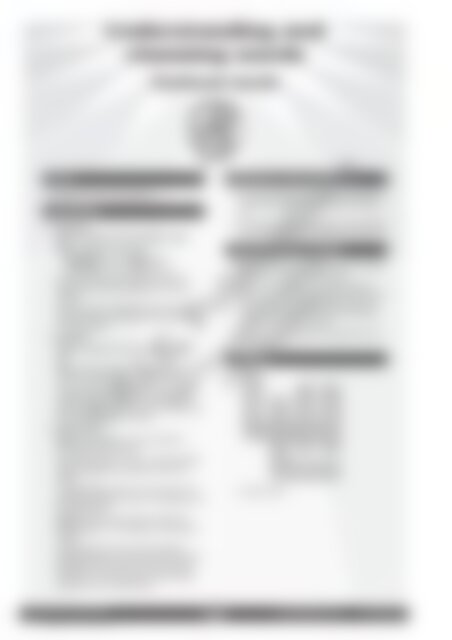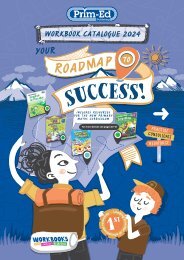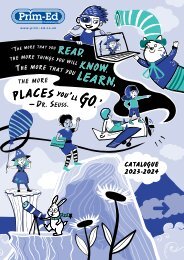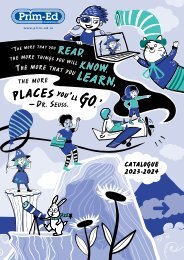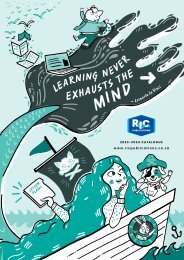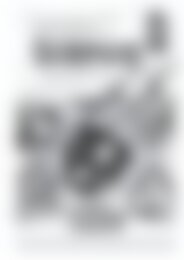RIC-6242 Primary Grammar and Word Study - Book C
Create successful ePaper yourself
Turn your PDF publications into a flip-book with our unique Google optimized e-Paper software.
Underst<strong>and</strong>ing <strong>and</strong><br />
choosing words<br />
Confused words<br />
Focus<br />
quiet/quite, tired/tried, dessert/desert<br />
Explanation<br />
• quiet/quite<br />
Quiet is an adjective that means still or silent.<br />
Quite is an adverb. It can mean:<br />
completely; e.g. to be quite perfect<br />
reasonably; e.g. to be quite proficient.<br />
The pronunciation of each word is different but<br />
if speech is not clear, the difference may not be<br />
apparent.<br />
Confusion occurs in reading <strong>and</strong> writing as both<br />
words contain the same letters with only the last two<br />
in reverse position.<br />
• tired/tried<br />
Tired is an adjective that means sleepy or worn<br />
out.<br />
Tried is the past participle of the verb to try, which<br />
means to make an effort to achieve something.<br />
The pronunciation of each word is clearly different.<br />
Confusion occurs in reading <strong>and</strong> writing as both<br />
words contain the same letters with only the second<br />
<strong>and</strong> third letters in reverse position.<br />
• desert/dessert<br />
Desert is a homograph <strong>and</strong> has two different<br />
pronunciations <strong>and</strong> meanings.<br />
One meaning, which is a noun, is ‘a place with little<br />
rainfall’. In speech, the emphasis is on the first<br />
syllable.<br />
The other meaning, which is a verb, means ‘to run<br />
away with no intention to return’. The emphasis is on<br />
the second syllable.<br />
Dessert is a noun which means a ‘sweet meal<br />
eaten after dinner’. The emphasis is on the second<br />
syllable.<br />
Confusion generally occurs with the spelling. A<br />
possible strategy for remembering is that the sweet<br />
meal which we often want more of has a double<br />
consonant (more), <strong>and</strong> the desert, which has little<br />
rain, has only one consonant (less).<br />
Worksheet information<br />
• Discuss the meaning of each word <strong>and</strong> highlight the<br />
similarities <strong>and</strong> differences of the spelling of each<br />
pair.<br />
• In Question 2, give students free rein to explain how<br />
they see the similarities <strong>and</strong> differences of each pair.<br />
Ideas for further practice<br />
• Dictate a short text including all the words. Students<br />
write the text. Correct as a group/class.<br />
• Make six cards with one of the words written on<br />
each card. In small groups, students place the cards<br />
face down <strong>and</strong> take turns to choose a card. They<br />
explain to the others how the word is pronounced,<br />
how it is spelt <strong>and</strong> what it means.<br />
• In groups, students take turns to explain the use of<br />
each pair of words.<br />
Answers<br />
1.<br />
1.<br />
5.<br />
t<br />
r q q<br />
4.<br />
i d u u<br />
e e i i<br />
d e s s e r t<br />
6.<br />
2. Teacher check<br />
e t e<br />
r<br />
2. 3.<br />
©R.I.C. Publications<br />
Low Resolution Images<br />
Display Copy<br />
t i r e d<br />
<strong>Primary</strong> grammar <strong>and</strong> word study 54<br />
www.ricpublications.com.au R.I.C. Publications ®<br />
ISBN 978-1-74126-766-2


